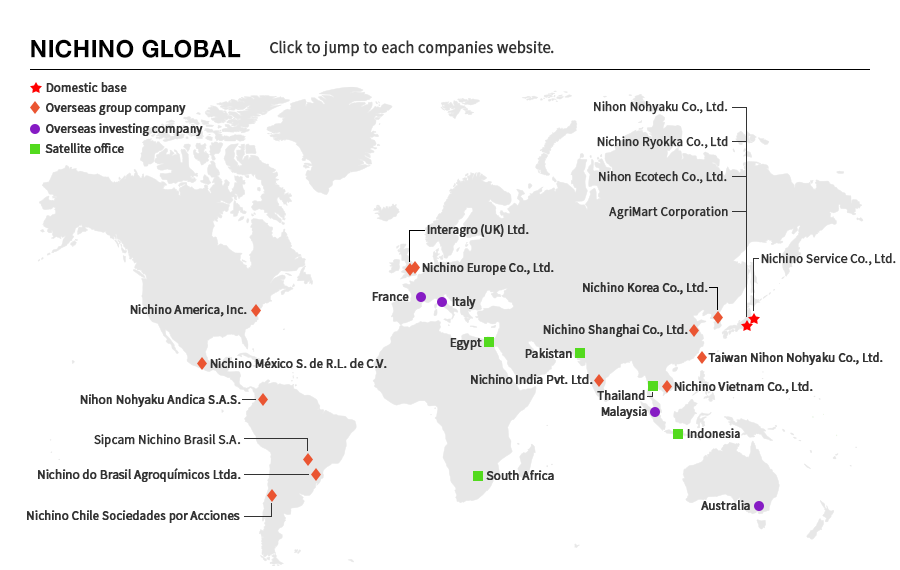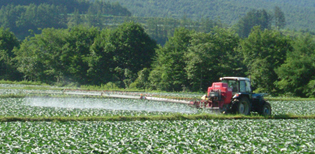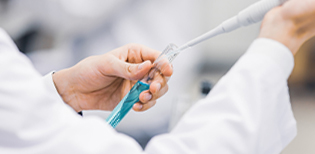Response to Climate Change
- Response to Recommendations of the Task Force on Climate-related Financial Disclosures (TCFD)
- Strategy
- Indicators and Targets (Initiatives to Reduce GHG Emissions)
- Initiatives to Save Energy
One of the main SDGs calls for urgent action to combat climate change and its impacts. Last year, many countries announced targets toward attaining carbon neutrality as an effort to realize a low-carbon society. Two companies in NICHINO Group, Nihon Nohyaku and Nichino Service, have achieved solid results through related activities so far, and we will respond to climate change as part of our Group Sustainability activities by ascertaining the circumstances of the entire Group including overseas affiliated companies.
Response to Recommendations of the Task Force on Climate-related Financial Disclosures (TCFD)
As the world population continues to increase, concerns over insufficient food supply due to an impact of climate change, etc. are becoming more serious. In addition, initiatives toward the realization of a decarbonized society are getting momentum on a global basis to mitigate the advancement of climate change. NICHINO Group has been taking the initiative to counter the issue of climate change so that we can ensure a safe and steady food supply and improve the quality of life for all. We have set “raising the level of environmental management” as one of our seven priority Sustainability issues and have been proceeding with climate change countermeasures accordingly.
In February 2022, we announced our agreement with the “Recommendations of the Task Force on Climate-related Financial Disclosures (TCFD).” In line with the TCFD Recommendations, we have analyzed and evaluated the impact of climate change on the Company’s business activities in multiple scenarios, and have established and been managing the countermeasures. Based on its Sustainability Basic Policy, “contributing to food and the environment / society through technological innovation,” NICHINO Group has been working to realize sustainable society through our business activities and increase corporate value further.

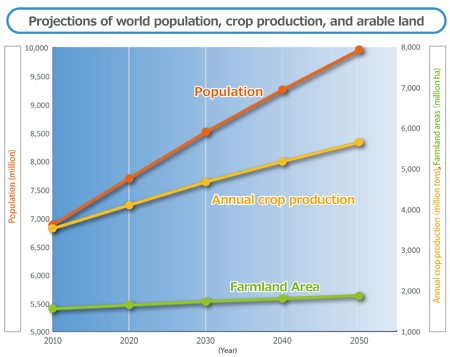
<Necessity of agrochemicals to meet the demand for food caused by increasing world population>
The world population stands at 7.8 billion people as of today, and is expected to reach 9.7 billion people in 2050. Countries in Africa, Latin America and Southeast Asia in particular show a significant increase in the population, and it is obvious that there will be a food shortage to a serious degree, if nothing is to be changed. However, it would be difficult to rapidly expand the farmland areas from the viewpoint of protection of the natural ecosystem in forests, etc.
Therefore, in order to save the mankind from starving, it is indispensable that food production increases based on improvement of agricultural productivity. The most damaging to agricultural products are pest infestations and weeds. To increase harvest volume, it is necessary to protect crops from them using agrochemicals.
With the aim of contributing to solving food issues, Nihon Nohyaku will continue to proceed with technological innovation, provide various products and services, and thereby support people’s health and lives.
Strategy
World population is expected to continuously increase. However, there is a limitation in expansion of farmland areas, and there are concerns over deforestation, etc. caused by expansion of farmland. In addition, there is a possibility that farmland areas decrease due to such reasons as an increase in extreme weather caused by climate change. Accordingly, stable agricultural production through agricultural materials such as agrochemicals is indispensable for supporting the increased demand for food following the population growth.
In its “Corporate Vision,” “What we want to be in the future,” and “What we want to be in 2030,” NICHINO Group has set its basic policy of ensuring a steady food supply and improving the quality of life for all through technological innovation, and is committed to contributing to the realization of sustainable society.
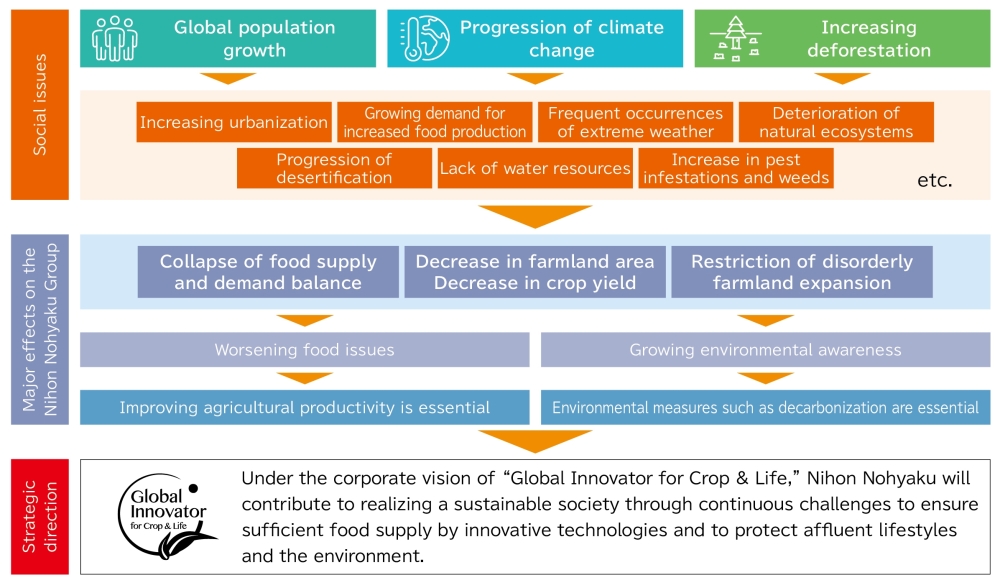
The Group has conducted scenario analysis on risks and opportunities related to climate change that may affect the realization of “What we want to be in 2030,” with reference to the Below 2 °C scenario and the 4 °C scenario. Major risks and opportunities are as follows.
●Risks ●Opportunities Degree of impact: Extremely large: More than 5 billion yen; Large: 500 million yen to 5 billion yen; Medium: 50 million yen to 500 million yen; Small: Less than 50 million yen (The degree of impact is determined based on net sales.)
| Category | Risks / opportunities | Details of risks / opportunities | Degree of impact (2030) | Referenced scenario | Measures to mitigate risks / make use of opportunities |
|---|---|---|---|---|---|
| Transition | ●Introduction of carbon pricing | There is a risk that the introduction of carbon pricing including carbon tax progresses toward the realization of a decarbonized society, which results in increased financial burden. | Medium | Below 2 °C scenario (IEA’s Sustainable Development Scenario) |
We are working to reduce GHG emissions in a comprehensive manner based on our medium- to long-term plans, through such efforts as making transition to renewable energy and using biofuels |
| ●Surging raw material prices | There is a possibility that procurement becomes difficult due to changes in energy policies toward decarbonization which in turn cause changes in energy supply and demand and surges in raw material prices and energy costs. | Large | Beyond 2 °C scenario (IEA’s Stated Policies Scenario) | We are working on not only risk mitigation through diversification of raw material sources and renewals to establish production facilities which consume less energy but also sophistication of collaborations and partnerships from a perspective of the entire supply chain through accurate understanding and analysis of energy-conservation measures of various countries. | |
| ●An increase in energy costs | Medium | ||||
| ●A decrease in demand for carbon intensive products ●An increase in demand for decarbonized products |
There is a possibility that needs for products manufactured with a large amount of greenhouse gas (GHG) emissions decrease following the increased demand from customers and selling partners for eco-friendliness. - On the other hand, there is a possibility that needs for products manufactured with a small amount of GHG emissions increase. |
Medium |
We are working to streamline the manufacturing process and considering to develop and introduce innovative manufacturing technologies, and will work to create product assortments such as biopesticides which are expected to have a small amount of carbon emissions in the manufacturing process. | ||
| ●Improved reputation among customers for cutting-edge initiatives | There is a possibility that our reputation improves as customers give high marks to our initiatives toward decarbonization and enhanced information disclosure. | Medium | We will accelerate our efforts toward technological innovation based on accurate predictions and medium- to long-term R&D perspectives and work to disclose information appropriately, in light of the direct relationship of climate change with agriculture and characteristics of business. | ||
| ●Improved evaluation among investors for our ESG investment | There is a possibility that investors give high marks to the Group’s carbon efficiency and their evaluation of our ESG investment improves. | Medium | We will maintain and improve the Group’s carbon efficiency, which is at a high level even in the chemical industry, and work to disseminate information on our ESG management actively, in relation to such efforts as priority Sustainability issues including measures to reduce GHG emissions. | ||
| Physical | ●A decrease in demand due to decreased farmland areas | There is a possibility that demand for agrochemicals decreases due to a decrease in farmland areas caused by an impact of climate change, etc. | Large |
Below 2°C scenario (IPCC SSP1) 4°C scenario (IPCC SSP3) |
We will contribute to preservation of farmland and improvement of agricultural productivity from a holistic perspective of crop protection, not only through chemical pesticides but also by newly entering into the business area of crop protection materials such as biotic pesticides and biostimulants and promoting smart agriculture which makes skillful use of IT technology. |
| ●An increase in demand due to increased crop production volume | There is a possibility that demand for agrochemicals necessary for increasing yields increases, as demand for crops and production volume increase due to global population growth. | Extremely large | |||
| ●An increase in demand due to increased pest infestations, etc. | There is a possibility that demand for agrochemicals increases due to increased damage from pest infestations and weeds caused by a temperature rise, etc. | Medium | 4°C scenario (IPCC SSP3) | We are pushing forward with establishment of data-driven marketing strategies grounded in agricultural production sites and working to offer products and services which meet needs of producers by swiftly and accurately identifying occurrence of pest infestations and weeds, changes in damage therefrom, and changes in needs of the sites associated therewith. |
Indicators and Targets (Initiatives to Reduce GHG Emissions)
As part of our efforts to create a low-carbon society, NICHINO Group is aiming to reduce its CO2 emissions compared to the previous year. Furthermore, we aim to achieve a 23% reduction (Scope 1*2+2*3) for the entire Group*1 from 2020 levels in 2030, and achieve carbon neutrality in Japan and Brazil in 2050. (In India, our target is 2070 due to the national policies). We aim to gradually become carbon neutral while keeping an eye on trends in energy policies in each country.
*1 Nihon Nohyaku and other Group companies that have manufacturing sites. We have manufacturing sites in Japan, India, and Brazil.
*2 Direct emissions of GHG by the reporting company.
*3 Indirect emissions from the use of electricity, heat, or steam supplied by others.
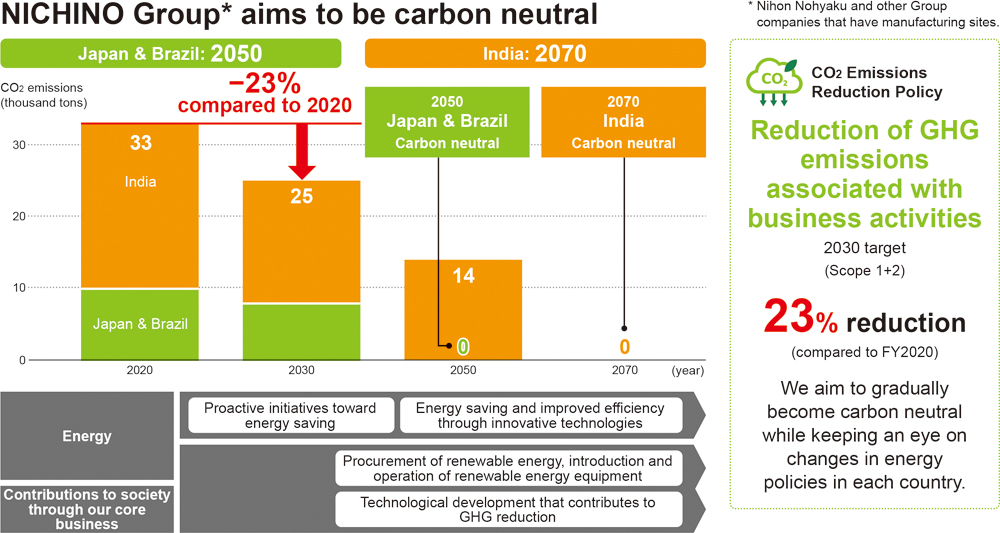
Initiatives to Save Energy
Nihon Nohyaku and Nichino Service are specified business operators defined in the Energy Conservation Act (Act on Rationalizing Energy Use and Shifting to Non-fossil Energy). Our goal is to reduce energy consumption unit from the previous year and the past five-year average of that by 1% or more. Other domestic Group companies have also set goals that match their business conditions and are working on energy conservation measures such as switching to LED lighting and eco-driving.
Overseas Group companies are working to determine the actual state of their energy usage while promoting energy conservation efforts. Going forward, the entire Group will work together as one to further promote energy conservation.

